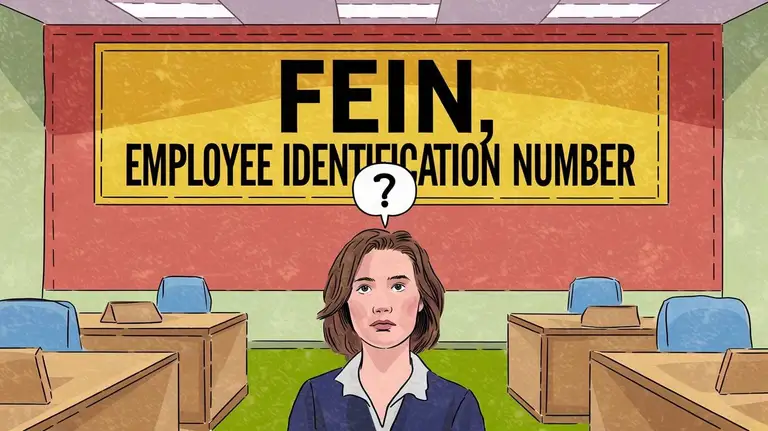A Federal Employer Identification Number (FEIN) is a unique identifier assigned by the Internal Revenue Service (IRS) to business entities for tax administration purposes.
Also known as an Employer Identification Number (EIN) or Federal Tax ID Number, it is used by companies to manage business tax obligations, open business bank accounts, and comply with federal regulations.
If you've encountered terms like FEIN definition, FEIN meaning, or FEIN stand, this guide will clarify everything, from how it differs from other taxpayer IDs to how businesses can apply for one.
Why businesses need a FEIN

Tax compliance and reporting
Businesses must use their Employer Identification Number for filing tax returns, paying excise taxes, and fulfilling other tax obligations. A FEIN distinguishes a business from an individual taxpayer identification number (ITIN) or Social Security Number (SSN).
Business operations and banking
A FEIN is required to open business bank accounts and separate personal finances from business operations. It is essential for securing loans, applying for business credit, and engaging in government entities contracts.
Hiring employees and payroll processing
The IRS prefers online applications for EIN issuance to expedite compliance for business owners. Companies must provide their employer account number when reporting employee Medicare premiums, Social Security withholdings, and payroll taxes.
Identity protection and security
A FEIN helps prevent identity theft since businesses can use an EIN instead of an SSN on forms. It is also used by legal counsel and accountants to ensure compliance with various business structures.
Key differences between FEIN and other taxpayer identification numbers
A FEIN differs from other types of taxpayer identification numbers.
A Social Security Number (SSN) is issued to individuals, while a FEIN is issued to businesses. An SSN is used for personal tax filing, whereas a FEIN is required for tax and payroll purposes. A FEIN helps protect business identity, whereas an SSN serves as a personal identifier.
It also differs from an Individual Taxpayer Identification Number (ITIN). While an FEIN is issued for businesses, an ITIN is assigned to non-resident aliens and individuals with tax obligations who do not qualify for an SSN.
A FEIN is also not the same as a Preparer Taxpayer Identification Number (PTIN), which is required for tax preparers. A FEIN applies to multiple businesses, while a PTIN is used by professionals handling business tax ID matters.
Another distinction is between a FEIN and an Adoption Taxpayer Identification Number (ATIN). The ATIN is for individuals adopting a child and has no business use, while a FEIN is strictly for business purposes.
How to apply for a FEIN
Online application
The IRS website allows businesses to apply electronically. The IRS prefers online applications since they process faster within business days.
Mail or fax application
Businesses can complete Form SS-4 and submit it via mail form or fax. For a return fax number, businesses can request correspondence from the IRS operation in Cincinnati.
Application for international businesses
For an EIN international operation, the application process differs for non-resident aliens and foreign entities. These businesses must apply via phone or fax instead of using the online application.
When to use a FEIN
A FEIN is necessary when filing business tax forms, opening a bank account, hiring employees, applying for a Keogh plan for retirement savings, and establishing grantor-owned revocable trusts.
Myth busting: Common misconceptions about FEINs

Myth 1: Only large corporations need a FEIN
Many believe that most businesses don't require a new FEIN unless they operate as a large corporation. This is incorrect. Certain types of entities, including sole proprietorships with employees, partnerships, and LLCs, must obtain an EIN. Even other entities, such as trusts and estates, often require an EIN for tax purposes.
Myth 2: A FEIN replaces your social security number for all business matters
Some think that once they have a FEIN, they no longer need to provide their Social Security Number (SSN). While a FEIN is used for tax filings and payroll reporting, the Social Security Administration still requires SSNs for individuals when applying for benefits. Business owners must use their SSN in certain legal and financial situations, such as verifying legal residence or establishing personal credit.
Myth 3: A FEIN is permanent and never needs updating
Many assume that once a business receives its FEIN, it never changes. However, the IRS office in Cincinnati and other IRS divisions require businesses to obtain a new FEIN under specific conditions. If a company changes its principal place of operation, the responsible party, or undergoes restructuring, a new FEIN may be necessary. Additionally, box B on IRS forms highlights cases where changes in ownership or structure impact EIN validity.
By understanding these myths, businesses can ensure they remain compliant with tax regulations and avoid common misconceptions about the ein operation process.
➡️ Understanding how the specialty tax line works is crucial for businesses managing complex tax obligations. Some assume that applying for a FEIN means they automatically receive access to all necessary tax classifications. However, certain businesses must still contact the specialty tax line to handle specific filings, such as excise taxes or employment taxes.
Additionally, working with professionals who have extensive experience in EIN registration and sales tax compliance, for example, can prevent costly mistakes. Many business owners make errors during the EIN operation process, leading to unnecessary delays. Seeking guidance ensures compliance, especially when dealing with legal residence requirements or multi-state business structures.
Final thoughts
Understanding what FEIN means is essential for businesses managing tax obligations, financial operations, and legal compliance. Whether starting a new company or expanding internationally, obtaining a FEIN number is a fundamental step. For more details, visit the IRS website or consult legal counsel specializing in tax matters.
With a clear grasp of FEIN definition, application process, and how it supports businesses, you're well-equipped to handle tax compliance and financial matters efficiently.
Common questions about FEIN
Can sole proprietors obtain a FEIN?
Yes, but a sole proprietor can use an SSN instead of a FEIN number unless hiring employees. If a sole proprietor decides to hire workers, establish a Keogh retirement plan, or file excise tax returns, obtaining a FEIN becomes necessary. Even if they have no employees, some financial institutions may require a FEIN to open a business bank account.
Is a FEIN public information?
A FEIN public record does exist, but full details are not always disclosed unless required by law. Some businesses might have their FEINs publicly accessible through regulatory filings, government databases, or business credit reports. However, the IRS does not release FEINs directly to the public to prevent fraud and identity theft. If a business owner needs to verify a FEIN, they can contact the IRS or check financial documents where the FEIN may be listed.
Can one business have multiple FEINs?
Some business structures, such as corporations with subsidiaries or divisions operating under different legal entities, may need a new employer identification number for each entity. For example, if a corporation owns multiple LLCs, each LLC may require its own FEIN. However, a single business entity typically has only one FEIN unless it undergoes significant restructuring, such as a merger, acquisition, or change in ownership.
How long does it take to receive a FEIN?
If applying through the online application, businesses can receive their EIN immediately upon completion of the process. For applications submitted via fax, it typically takes about four business days to process. Mail applications can take significantly longer, often requiring up to four weeks. International applicants or businesses requiring additional verification may experience extended processing times.
What happens if a business loses its FEIN?
If a business misplaces its FEIN, it should first check tax returns, bank records, or any official IRS correspondence where the FEIN might be listed. If it cannot be found, the business must contact the Internal Revenue Service Attn: Business Tax ID Unit for assistance. The IRS can provide the FEIN to the responsible party after verifying business ownership and identity. To avoid losing the EIN in the future, businesses should keep it documented in secure financial records.








